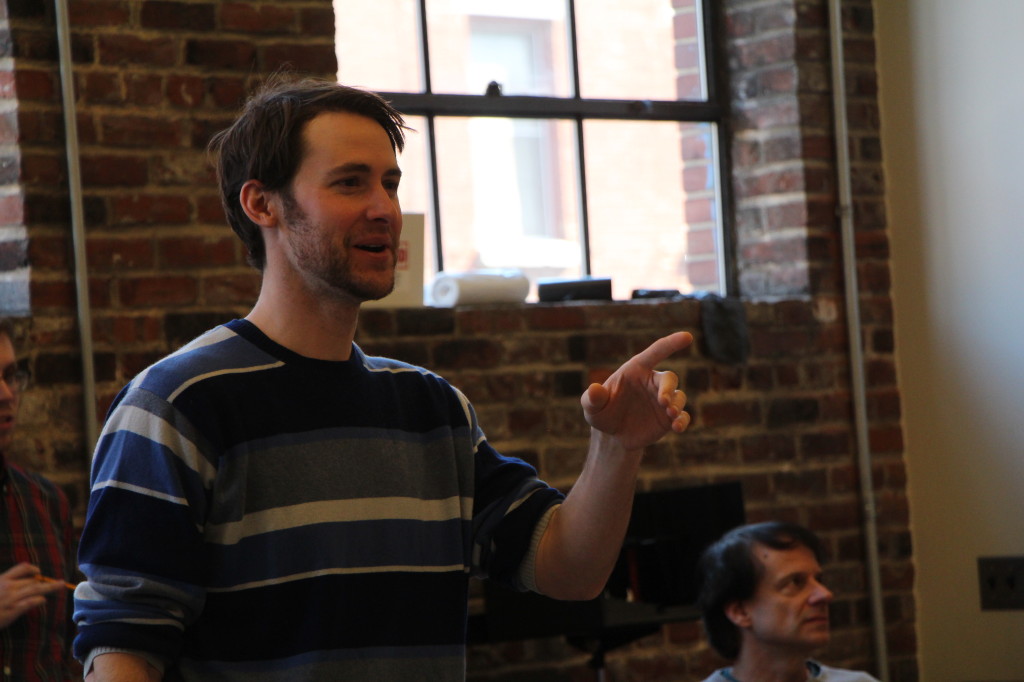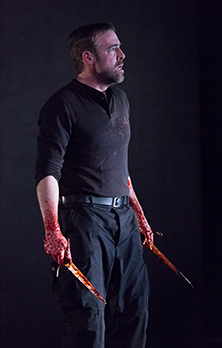When Phindie last caught up with Alexander Burns, he was an upstart director forging a path with Mount Airy’s Quintessence Theatre Group. His productions of contemporary-tinged classics have since attracted the attention of audiences well beyond Northwest Philadelphia. The Arden Theatre Company invited him to direct his first work for a major theater, MACBETH, running through April 19. In this two-part interview, we reconnect with Burns to get a glimpse into his influences and his experiences working at the Arden.

Henrik Eger: When Johann Wolfgang von Goethe, as a young boy, saw an English troupe perform Christopher Marlow’s Doctor Faustus, it impacted him so much that, many years later he wrote Faust, Germany’s equivalent to Hamlet and King Lear. What was it in your childhood and young adulthood that got you into theater, and especially Shakespeare?
Alexander Burns: When I was born, my mother, Lisa Hemphill-Burns, was designing costumes at People’s Light and Theatre Company, in Malvern. She was designing a production of MACBETH that Charles Conwell was directing, and I grew up hearing stories that they almost didn’t let my mother work on the show because of the “Macbeth curse.” So I was born into Shakespeare, more importantly American Shakespeare.
I will never forget the first time I saw Hamlet. My sister and I were out playing on the street in Mt. Airy, Philadelphia. We heard drums banging, and discovered it was an outdoor touring Shakespeare company performing on the then Pennsylvania School For The Deaf campus, now New Covenant. I still remember the scaffolding they set up in the middle of the huge field and the graveyard scene in which Hamlet recognizes a skull that is handed to him by a gravedigger. I don’t think I had ever really thought about death until that moment.
A couple years later, when I was 13, my father was working in England, and my family moved there to join him for two years. I was exposed to blockbuster epic classic theatre at the National and RSC [Royal Shakespeare Company], watching the likes of Antony Sher, Fiona Shaw, Alan Bates, Judy Dench, directed by Peter Hall, Peter Brook, Jonathan Miller, Adrian Noble, and Phyllida Lloyd.
Eger: Did you ever perform in a Shakespeare play?
I was attending a private all boy’s school in north London where I got to play Menteith in an all-male MACBETH and the following year Rosalind in As You Like It. It was during this time that the performance of Shakespeare became an essential part of who I am as a human being. I came to understand the pentameter of Shakespeare’s verse as my heartbeat. I didn’t really want to direct Shakespeare until I realized it was the only place that I, as a young director, could explore epic theatre in America.
For some reason people will let a young director take on Shakespeare with 14 actors, and I like working with large ensembles, telling large stories. Naturalism on stage bores me, because, for me, film and television do it better. The artifice of acting and design is what excites me the most about theatre. Therefore Shakespeare is where I feel most alive.
Eger: How did your professional relationship with the Arden Theatre evolve?
Burns: I grew up watching Terry Nolen and Aaron Posner’s productions at the Arden. I experienced many classics for the first time through the Arden: Shakespeare, Ibsen, Shaw. Part of the reason I thought I could build Quintessence in Philadelphia was because of their success at developing an audience for the classics in Philadelphia.
Terry reached out to me after seeing my production of Hamlet at Quintessence and asked if I had any interest in doing a Shakespeare at the Arden. To present Shakespeare with the Arden’s resources in a 400 seat theatre in Philadelphia is truly a dream come true. Add to that, the opportunity to collaborate with Arden ensemble member Ian Merill Peakes, who I hold to be one of America’s great Shakespearean actors, and it all seemed too good to be true.

Eger: You also talked about having had “a Romeo moment, a Juliet moment.” Could you give some examples where Shakespeare connected you with one of the most exuberant moments in life, but also helped you get over an emotional hump?
Burns: When Romeo and Juliet begins, Romeo is head over heals in love with Rosalind (remember her?). Romeo makes his great ode to being in love: “bright smoke, cold fire, sick health”—and he hasn’t even met Juliet yet. Shakespeare’s understanding of human nature has been helpful to me in my attempt to comprehend and embrace my own complexity. I have been both Romeo and Paris, Brutus and Caesar.
I’ll never forget the night I spent [during] my freshman year of college, sitting on the side walk under the window of a lover’s dorm room, freezing, and yet hoping he would look out and see me. My Romeo-like persistence paid off, as we spent eleven incredible years together.
Eger: Wow, Shakespeare seems to have done a lot for you.
Burns: Understanding mankind through Shakespeare has helped me to deal with life’s absurdity. Ultimately, more than his characters, it is Shakespeare’s words which sustain me. [I can’t recall] the number of times I have said under my breath, “forsooth I know not why I am so sad,” or “there are tides in the affairs of men,” or “there’s nothing either good or bad, but thinking makes it so.” For me, Shakespeare’s poetry is stronger than any psalm or biblical verse at fortifying my soul.
Eger: Did you do anything that set you apart from most other MACBETH directors?
Burns: I have seen over twelve professional productions of MACBETH and have never seen Hecate [Greek “goddess of witchcraft, ghosts and necromancy” who “communicates with the dead to predict the future”] on stage before. It was very important to me to keep Hecate as it creates a hierarchy in the supernatural world [in which] the witches are also subordinates to a leader and are being chastised for not following that order.
Eger: In the auditioning process, what were you looking for in MACBETH (Ian Merrill Peakes), Lady MACBETH (Judith Lightfoot Clark), and the other characters (with a wide range of Philadelphia actors)?
Burns: When I proposed MACBETH to Terry, it was conceived with Ian at its center. The challenge was then to build a world around Ian’s MACBETH. I have seen Ian onstage many times, but I was blown away by his Iago at the Folger Theatre in DC. Ian has an effortless power with Shakespeare’s text. He can achieve majesty, while remaining charismatic and vulnerable, and never at the expense of the poetry.
I knew I needed to find a very special, very powerful actress to be his “partner in greatness” and I had the good fortune of seeing PAC’s Blood Wedding last fall, in which Judith was playing the matriarch. As soon as the show was over, I knew I had found my Lady Macbeth. Judith is a force of nature with a unique combination of intelligence, beauty, power, and sexuality. I will be forever grateful to Judith for jumping headlong into this process with me.
Eger: What was the difference for you, casting and directing a Shakespeare play at Quintessence compared to the Arden, where you worked as a first-time guest director?
Burns: The greatest challenge of directing MACBETH at the Arden was the lack of time. I am used to having at least a month of rehearsal on a Shakespeare play at Quintessence. We only had three weeks including tech before our first audience for Macbeth. The time for exploration and marination, my favorite part of the creative process, was limited.
My favorite part of work at the Arden, and this was a true surprise to me, was the conversations I had with Terry [Nolen] after each of the preview performances. To have a fellow director, equally invested in the project and its development, but who had a fresh and different perspective, was incredibly helpful to me.
Eger: How did you and the actors at the Arden deal with the tremendous pressure that Shakespeare created through the Scottish play?
Burns: Unlike Shakespeare’s dark comedy The Merchant of Venice, the tragedy of MACBETH comes full circle, and therefore the cycle of darkness that the play unleashes is resolved with the deaths of the Macbeths. I think the bigger challenge on this play, and specifically this production, is that the entire cast is running full throttle from the top of the show until the end.
I spent every second of the three weeks I had with the ensemble working to amp up the show’s potency and fine tune the language. Ultimately, the intricate choreography—both in terms of combat and dance—and the Shakespearean doubling, brought the ensemble together.
The show is a very intricate machine and every cast and crew member is essential in making it run smoothly. The energy and physical feat of performing Shakespeare’s tragedy, plus the stage combat, plus the dancing, all the while safely navigating the entrances and exits off the elevated black disk that is our set, is quite extraordinary and taxing on [the] minds and bodies of the company. It is a testament to their incredible craft and commitment to this project that we have pulled off this MACBETH.
Eger: “To-morrow, and to-morrow, and to-morrow, /Creeps in this petty pace from day to day.” Alex, I appreciate your willingness to answer all these questions, in spite of “the absurdity of [your] current life/schedule”— already working feverishly on your next “to-morrow” at the Quintessence Theatre.
- Read Phindie‘s 2011 interview with Alexander Burns
- Burns’s MACBETH is the subject of Critical Mass, a multi-part review on Phindie
- Read Henrik Eger’s feature on the drunk porter scene from this production of MACBETH on Broad Street Review.
